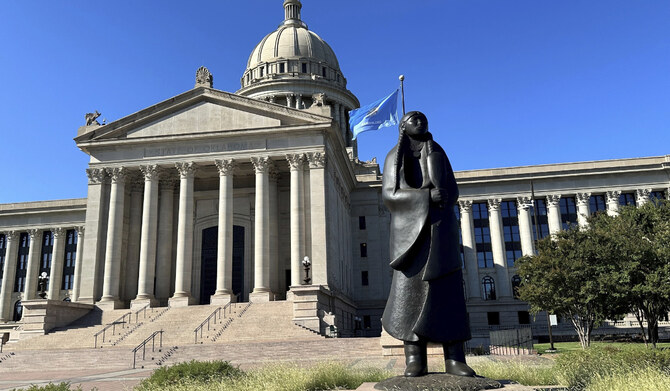JEFFERSON CITY, Missouri: The FBI and the US Postal Inspection Service on Tuesday were investigating the origin of suspicious packages that have been sent to or received by elections officials in more than 15 states, but there were no immediate reports of injuries or that any of the packages contained hazardous material.
The latest packages were sent to elections officials in Alaska, Colorado, Georgia, Indiana, Kentucky, Massachusetts, Missouri, New York and Rhode Island. Mississippi authorities reported a package was delivered there Monday, and the Connecticut Secretary of State’s office said the FBI alerted it of a package that was intercepted.
The FBI is collecting the packages, some of which contained “an unknown substance,” agency spokesperson Kristen Setera in Boston said in a statement.
“We are also working with our partners to determine how many letters were sent, the individual or individuals responsible for the letters, and the motive behind the letters,” she said. “As this is an ongoing matter we will not be commenting further on the investigation, but the public can be assured safety is our top priority.”
It’s the second time in the past year that suspicious packages were mailed to election officials in multiple states.
The latest scare comes as early voting has begun in several states ahead of the high-stakes elections for president, Senate, Congress and key statehouse offices, causing disruption in an already tense voting season. Local election directors are beefing up security to keep workers and polling places safe while also ensuring that ballots and voting procedures won’t be tampered with.
The National Association of Secretaries of State condemned what it described as a “disturbing trend” of threats to election workers leading up to Nov. 5, as well as the second apparent assassination attempt on former President Donald Trump.
“This must stop, period,” the group said. “Our democracy has no place for political violence, threats or intimidation of any kind.”
The Colorado Secretary of State’s Office said a package containing white powder and with the sender listed as “US Traitor Elimination Army” was intercepted at a mail facility. It said the package was similar to those sent to other states and that early indications suggest the powder was harmless.
On Tuesday, the FBI notified the Massachusetts Secretary of the Commonwealth’s office that postal service investigators had identified a suspicious envelope delivered to a building housing state offices. The package was intercepted.
Packages also were sent to secretaries of state and election offices in Iowa, Kansas, Nebraska, Oklahoma, Tennessee and Wyoming this week. The packages forced evacuations in Iowa, Oklahoma and Wyoming. Hazmat crews quickly determined the material was harmless.
The Mississippi Secretary of State’s Elections Division said it received a package similar to those sent to other states and that the state Department of Homeland Security was testing it. The division said it has notified county election officials to be on the lookout.
Oklahoma officials said the material sent to the election office there contained flour.
“We have specific protocols in place for situations such as this,” Iowa Secretary of State Paul Pate said in a statement after the evacuation of the six-story Lucas State Office Building in Des Moines.
A state office building in Topeka, Kansas, was evacuated due to suspicious mail sent to both the secretary of state and attorney general, Kansas Highway Patrol spokesperson April M. McCollum said in a statement.
Topeka Fire Department crews found several pieces of mail with an unknown substance on them, though a field test found no hazardous materials, spokesperson Rosie Nichols said. Several employees were exposed to it and were being monitored.
In Oklahoma, the State Election Board received a suspicious envelope in the mail containing a multi-page document and a white, powdery substance, agency spokesperson Misha Mohr said. Testing determined the substance was flour.
State workers in an office building next to the Wyoming Capitol in Cheyenne were sent home Monday pending testing of a white substance mailed to the secretary of state’s office.
Suspicious letters were sent to election offices and government buildings in at least six states last November, including the same building in Kansas that received suspicious mail Monday. While some of the letters contained fentanyl, even the suspicious mail that was not toxic delayed the counting of ballots in some local elections.
One of the targeted offices was in Fulton County, Georgia, the largest voting jurisdiction in one of the nation’s most important swing states. Four county election offices in Washington state had to be evacuated as election workers were processing ballots cast, delaying vote-counting.
The letters caused election workers around the country to stock up the overdose reversal medication naloxone.
Election offices across the United States have taken steps to increase security amid an onslaught of harassment and threats following the 2020 election and the false claims that it was rigged.


























